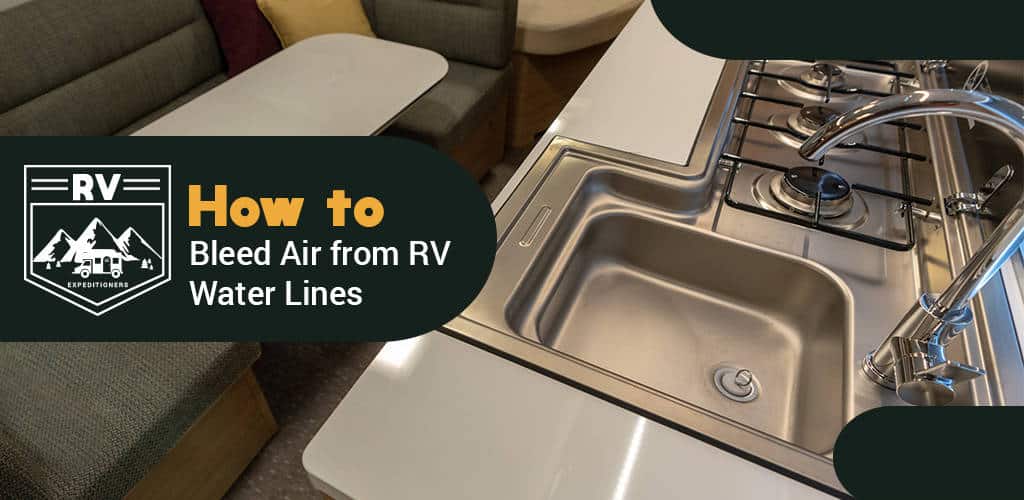Imagine jumping in the shower expecting warm water to wash away the weariness of the 14-hour drive you just finished. Instead, you get a puttering showerhead. The water is warm, but it is like someone is filling a shot glass and splashing you every few seconds.
Got air in your lines? Keeping air out of your system is almost unavoidable. Learn how to bleed air from your RV water lines quickly and do proper maintenance to nip problems in the bud.
Use a Water Source Already Under Pressure
Use a water source like the feed at a campground, but make sure to use a water pressure regulator (below). Hooking up the feed to a pressurized system is simpler than bleeding air with your water pump. Let the air out by opening the faucets and closing them again when they run smoothly.
Bleeding Air Out of Your RV Water Pump
Run water on the faucet furthest away from the pump and wait a while for the water to push the air out. The faucet will burble as air escapes and then run smoothly when all the air is gone.
Priming your water pump also removes the air inside. Follow these simple steps to prime your pump.
1) Locate your water pump and then disconnect the output pipe.
2) Disconnect the water output pipe and replace it with a rubber hose long enough to avoid a kick.
3) Pour clean water into a 12-oz container.
4) Lift the open end of the hose higher than the water pump and dump the water from the container into the hose.
5) Use your thumb to cover the open end of the hose and then flip your water pump on.
6) Turn off the pump when you feel the water on your thumb.
7) Disconnect the hose and put the water output pipe back in its place.
Bleeding Your RV Hot Water
You do not have to do this too often, but you will have to do it eventually. This process is simple but time-consuming. Set aside one to one and a half hours to do it.
1) Turn your heater off and let it cool down (30-40 minutes).
2) Test temperature by touching the sides and feeling for any heat. You should feel none.
3) Turn off the main water supply and turn on a faucet to decrease the water system pressure.
4) Turn off the pressure release valves and wait for the water to drain.
5) Close the valves and faucet when the water is gone.
6) Turn on the main water line.
7) Fill the water heater tank and switch it back on.
Other Ways to Prevent Air Entering Water Lines
Here are some ways to help minimize the amount of air entering your pipelines.
Turn Your RV’s Water Pump On or Off Only Once a Weekend
Running the pump does not use much energy, and it’s beneficial to have the pressure. This will help keep air from entering the system and building up in your pipes.
Inspect the Plumbing
Cracks in your pipes or loose connections can introduce air into your system. Tighten any loose fittings. Plug the holes and replace them when you are able; electrical/duct tape does an excellent job in a pinch.
Use a Water Pressure Regulator
Water pressure regulators help to maintain pressure in your water system and keep it from being blown out. Pressure in the system helps keep the air out, but too much blows your pipes. Piping damage is bad on its own, but imagine how much you would have to pay for water damage.
We can go on and on about how amazing water pressure regulators are, but let’s cover some basics. They are noteworthy enough to warrant a small slot here while talking about air in water lines.
- They are inexpensive for the protection they offer.
- They prevent the pressure from blowing your pipes out and flooding your RV.
- Attach the hose to your RV city water feed and attach your regulator at the hose end that hooks up to the city water feed.
- The lower the pressure, the lower the flow in your RV, so buy an appropriate water pressure regulator for your needs.
- Some water pressure regulators are adjustable and/or have gauges built into them.
- Use an odorless, tasteless RV hose; avoid the basic garden hoses.
Drain Water From Your Freshwater Tank
Some people remove water from their freshwater tank to reduce weight. Don’t empty it completely; leave water in the lines to keep them pressurized.
Check the Water Filter
Unclean water filters increase the chances of air getting into pipes. Cracked and damaged filters will allow more air to get into your system. Clean or replace water filters as needed.
Conclusion
Some air in your water lines is not a huge problem, and there are many ways to fix it. Proper care and maintenance ensure that it never escalates into a larger issue. Do a small amount of maintenance work, so you can continue to enjoy all the creature comforts of your home on wheels.

